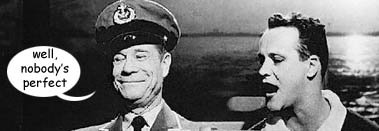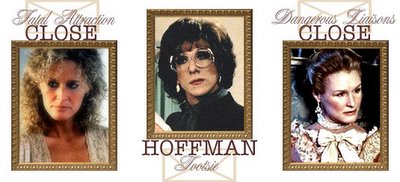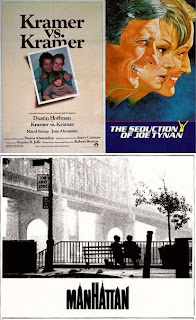 Streep at 60, A Retrospective
Streep at 60, A Retrospective
Previously: Julia, The Deer, 1978 OscarsSadie, Sadie (Un)married LadyOne of the fascinating things about old movies is the snapshots they take of their own time. Even in period pieces you can see the (then) modernity of the time period it was made in faintly stamped... a bit of reverse pentimento if you will. The Seventies might be the very best decade for cultural snapshots since it seems as if a large percentage of filmmakers were excited about capturing their own times rather than obsessing over eras gone by or creating imaginary worlds. That's arguably a naive modern perspective on the Seventies based on the films that endured but it feels like the truth.
Troubled marriages have been around since the sacred institution was invented. Naturally they've also been a part of cinema since
its invention. What is
Sunrise: A Tale of Two Humans (1927) for example but a portrait of a marriage in crisis? Troubled marriages were and are a cinematic mainstay but DIVORCE was something like a freshly hot topic in the 70s. The times they had been a-changing with women's lib, the sexual revolution, rising divorce rates. For a brief fascinating moment, Meryl Streep seemed to embody all of this. She was Bitter Icy Emasculating Ex-Wife and (stated more generously) The Liberated Lady.
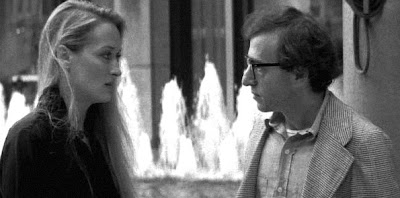
Isaac Davis (Woody Allen): Don't write this book. It's a humiliating experience.
Jill Davis (Meryl Streep): It's an honest account of our breakup.
Isaac: Everybody who knows us is going to know everything.
Jill: Look at you, you're so threatened.
Isaac: I'm not threatened. Of the two of us I wasn't the immoral psychotic promiscuous one.
I hope I didn't leave out anything.
Linda from
The Deer Hunter,
tearfully waiting for men to solve her, would have been confounded by Streep's 1979 women. Just as Meryl was coming into her own stardom, she created three far more liberated women. The highlight for some was her angry divorced lesbian Jill Davis in Woody Allen's
Manhattan with her 'suffering-this-fool' superiority and her deadpan catchphrase "It's an honest account of our marriage". She also played 'the other woman', a career girl in the political drama
The Seduction of Joe Tynan (I couldn't locate a copy so I can't comment so specifically there). Most famously, she won the Oscar playing the aggressively self-actualizing Joanna Kramer in
Kramer Vs. Kramer.
 Kramer Vs. Kramer
Kramer Vs. Kramer opens with a closeup on Meryl's teary face, her wedding ring facing the viewer. As succinct first images go, it's damn impressive. Joanna is telling her young son she loves him but this isn't just any bedtime tuck in. She's choking back tears. Joanna, we learn, is hopelessly depressed. She's about to pull
a Laura Brown and leave her young son behind to find herself. Her workaholic husband Ted (Dustin Hoffman) arrives home shortly thereafter still buzzing from his latest work triumph and talking a mile a minute. He's so
busy that he fails to even notice that his wife has packed her bags and is wiggling her keys at him, announcing her departure. He hasn't even looked at her or if he has, he hasn't truly seen her. Maybe not for a long time.
In his defense, she does blend in.
 Joanna Kramer's life is all beige. She must escape it.
Joanna Kramer's life is all beige. She must escape it.
The life she is leading is not a life she can continue to lead. She knows she's a shell of a woman and an incomplete person. Joanna's departure is one of the most exquisitely rendered scenes in Streep's filmography. It begins very sadly and sympathetically in her child's bedroom. As the weight of what she's doing hits the audience, Streep ices over, telegraphing both her hostility towards the husband she doesn't love and her own numbing survivalist impulses: She's leaving her boy behind... ready the anaesthesia!
As the war between the Kramers erupts outside their apartment, Ted snatching her suitcase from her and trying to talk her back into the apartment, Streep's performance really soars. Hoffman is only really asked to play two notes here: confusion and a get-her-back-inside agenda. Streep, further ahead in
Kramer Vs. Kramer's narrative as its driving force, has a whole barrelful. She has to incorporate confusion, fear, stay-on-track exit planning (she abandons her suitcase immediately when keeping it would be a struggle), anger, nearly suicidal grief, and years of pent-up anger into her face, line delivery and body language. Miraculously, it's all there just below the splintering ice.
As the elevator doors close on her old life, Joanna Kramer looks completely exhausted but Meryl Streep, thoroughbred actress, still has enough stamina for the scene's death blow.

[about her son] He's better off without me.
[to her husband] I don't love you anymore.
She punctuates this devastating opening scene with so much self-loathing, weary resignation and lost soul grief that it's nearly impossible to stop thinking about her. Her absence is a vacuum and the audience rushes in to fill it. Which, is exactly where the narrative needs you to be.
 For, despite its title, Kramer vs. Kramer
For, despite its title, Kramer vs. Kramer is not the story of a warring husband and wife but instead the story about a father and son coping with the sudden absence of this wife and mother. When Joanna returns to the movie, much later she is no longer the same woman. Neither are Ted and Billy the same father and son. Robert Benton's sensitive script and direction (both Oscar winners) detail the nuances and adult realizations of these changed dynamics. The court scenes as the Kramers fight for custody are appropriately sad and intrusive not least because both of the Kramers have already come to realize the rather gargantuan mistakes they have made in their marriage and child reading. And though Joanna's notion that personal happiness left her with no choice but to abandon her child may enrage some viewers, Streep has humanized the character enough to make any singular reaction to this complicated woman reductive.
Kramer vs. Kramer is definitely more of a time capsule than a timeless treasure but I submit that it's undervalued. Its reputation was surely damaged by its Oscar win over far superior envelope-pushing movies (
All That Jazz and
Apocalypse Now). To some it reads as an outdated sexist drama. That's certainly a valid read: the liberated woman in this case is quite possibly an unfit mother and is most definitely the icy antagonist while the abandoned husband is generally presented as a good father and likeable guy. But for all of
Kramer's male gaze (and it's definitely a man's picture) the film strikes me as an essentially honest exploration of the confusion that men must have felt at the time (and some probably still do) when they are forced into the discovery of the unknown Other lying beside them. Her dreams, as it turns out, are her own.
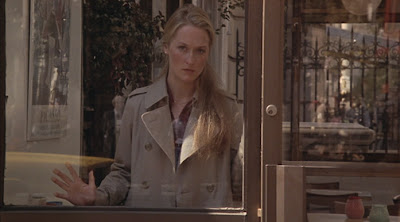
Though dated,
Kramer vs. Kramer is still absorbing thanks to the natural chemistry between Dustin Hoffman and screen son Justin Henry, the confident simplicity of the story and especially Streep's terrific star-making work. For anyone still assuming that their happiness is also their spouse's happiness, Joanna Kramer remains a discomfiting, restless spectre of the invisible, the unknowable and the unfulfilled. She still haunts.
*

 <--- Rue co-starred with Dustin Hoffman in Broadway's "Jimmy Shine" in 1969 (photo src)
<--- Rue co-starred with Dustin Hoffman in Broadway's "Jimmy Shine" in 1969 (photo src)












